PLEASE NOTE:
While the following article relates to your Google search, the services and methods at Goodwin Hypnosis may differ from those mentioned below. Since 2007, we have helped thousands of clients to overcome emotional and behavioral challenges when all else had failed. According to many of them (and their referring healthcare providers), our methods are faster than talk therapy, easier than willpower, and safer than medication. If you’re ready to resolve your issues, skip the article and visit the rest of our website, where you can learn about our unique approach, watch client testimonial videos, and discover how working with us one-on-one could be the solution you’ve been searching for.
Introduction
Jealousy is a complex emotion that many people encounter but often struggle to understand fully. It can arise in various aspects of life, from romantic relationships to friendships and professional environments, often stemming from deep-seated feelings of inadequacy and fear of loss. Recognizing the triggers and underlying causes of jealousy is crucial for addressing and managing it effectively.
Research indicates that jealousy manifests differently among individuals, particularly between genders. For instance, men are typically more affected by sexual infidelity, while women are more concerned with emotional infidelity. These distinctions highlight the importance of understanding the specific fears and insecurities that fuel jealousy in different contexts.
Addressing jealousy involves more than just recognizing its presence; it requires a deep dive into personal insecurities and past experiences that shape one's emotional responses. By identifying these internal triggers, individuals can begin to heal and make positive changes. The journey toward overcoming jealousy is supported by practical strategies, such as cultivating self-awareness, practicing self-compassion, engaging in open communication, and employing mindfulness techniques.
Additionally, focusing on gratitude and building supportive relationships can significantly reduce feelings of jealousy. Seeking professional help, when necessary, provides tailored strategies for managing complex emotions. Reframing jealousy as a motivator for personal growth and relationship enhancement can transform this challenging emotion into a source of strength and resilience.
Understanding and managing jealousy is a multifaceted process that requires patience, self-reflection, and consistent effort. By embracing these approaches, individuals can foster healthier, more fulfilling relationships and a stronger sense of self-worth.
Understanding Jealousy: Why It Happens
Jealousy is a multifaceted emotional response often rooted in feelings of inadequacy and fear of loss. It can emerge in various contexts, especially in romantic relationships, friendships, and professional settings. Comprehending the causes of envy is essential for addressing it effectively.
Research by Professor Mons Bendixen and Professor Leif Edward Ottesen Kennair has highlighted the complexity of envy, particularly how it differs between genders. Their study revealed that men are more likely to be jealous of sexual infidelity, while women are more likely to be jealous of emotional infidelity. This distinction highlights the significance of acknowledging the various forms of envy that appear and the underlying fears that motivate these emotions.
Jealousy can be triggered by perceived threats to one's self-worth, such as the fear that a partner might be attracted to someone else or that a friend may replace you in their affections. These emotions frequently result in harmful actions, causing harm to connections in the process. For instance, envy might lead people to behave in manners that are detrimental to their partners or friends, further worsening the situation.
Moreover, the study by Epley and James A Dungan on 'constructive confrontations' found that open communication about unresolved issues can lead to more positive outcomes than anticipated. In their experiment with 50 pairs of romantic partners, the confronted partners responded with less anger and more cooperation than expected. This implies that tackling envy openly and positively can reduce its harmful effects and encourage healthier connections.
Comprehending the origins of envy and how it varies among people can offer useful perspectives on handling this feeling. By recognizing the particular anxieties and uncertainties that provoke envy, individuals can strive for healthier, more supportive connections.
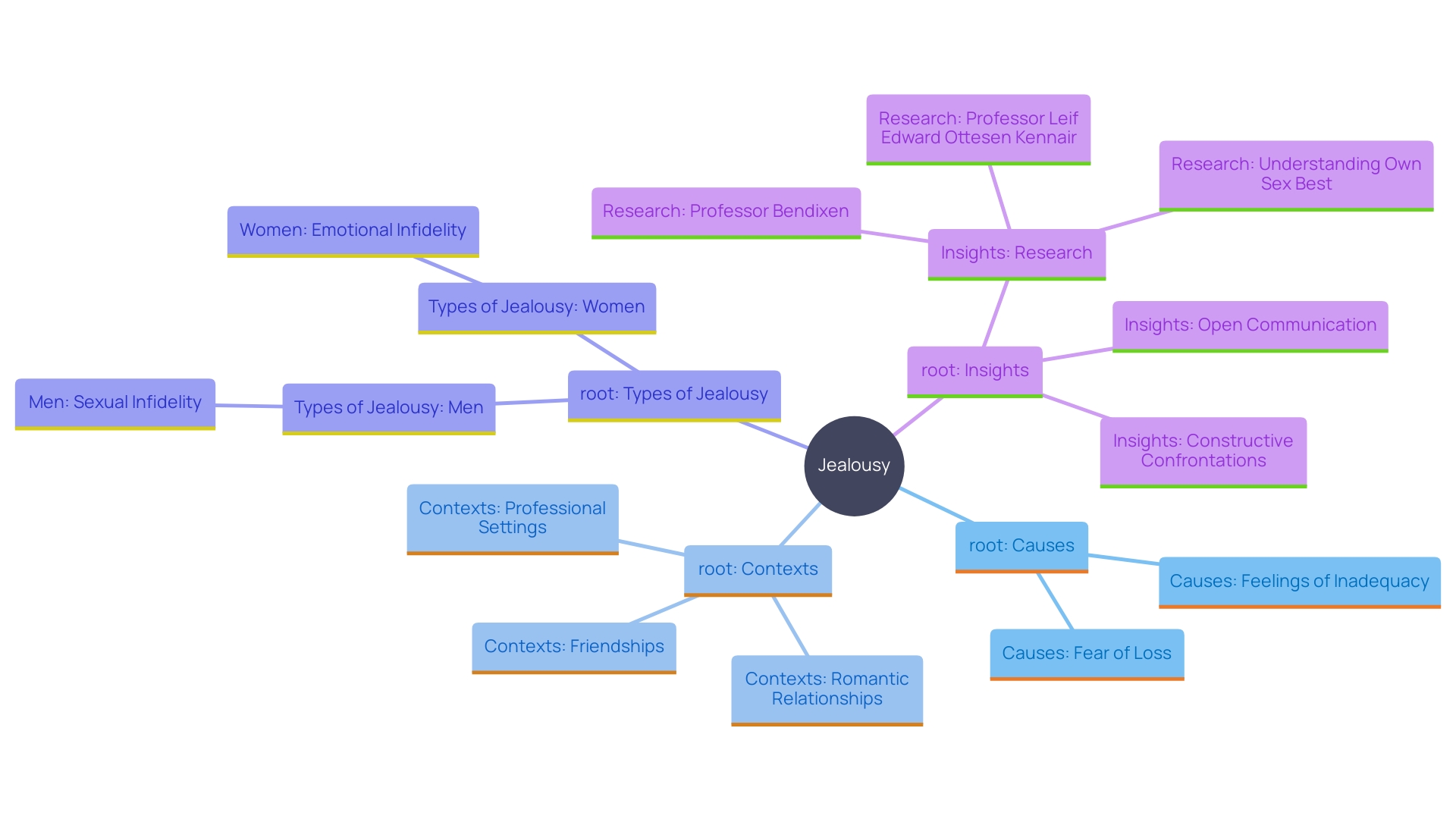
Identifying Internal Triggers: The Root Cause of Jealousy
Identifying the internal triggers that drive envy is a crucial step toward conquering it. These triggers are often tied to deeper insecurities or past experiences that shape our perceptions of relationships. For instance, individuals who have experienced betrayal or abandonment in the past may find themselves more vulnerable to envy. By contemplating personal experiences and feelings, it becomes possible to identify the specific thoughts and sensations that trigger envy, creating a foundation for healing and transformation.
Research by Professor Mons Bendixen and Professor Leif Edward Ottesen Kennair highlights the nuanced differences in emotional responses between men and women. Males often exhibit greater jealousy towards sexual betrayal, whereas females are more prone to be jealous of relational disloyalty. Understanding these differences can help in identifying personal triggers and addressing them effectively.
Case studies demonstrate that incorporating previous traumatic experiences is essential in halting the cycle of envy. This integration process allows individuals to move beyond their past, creating a new future and breaking free from repetitive emotional patterns. The findings from these studies indicate that self-awareness and reflective practices are key components in overcoming envy and fostering healthier relationships.
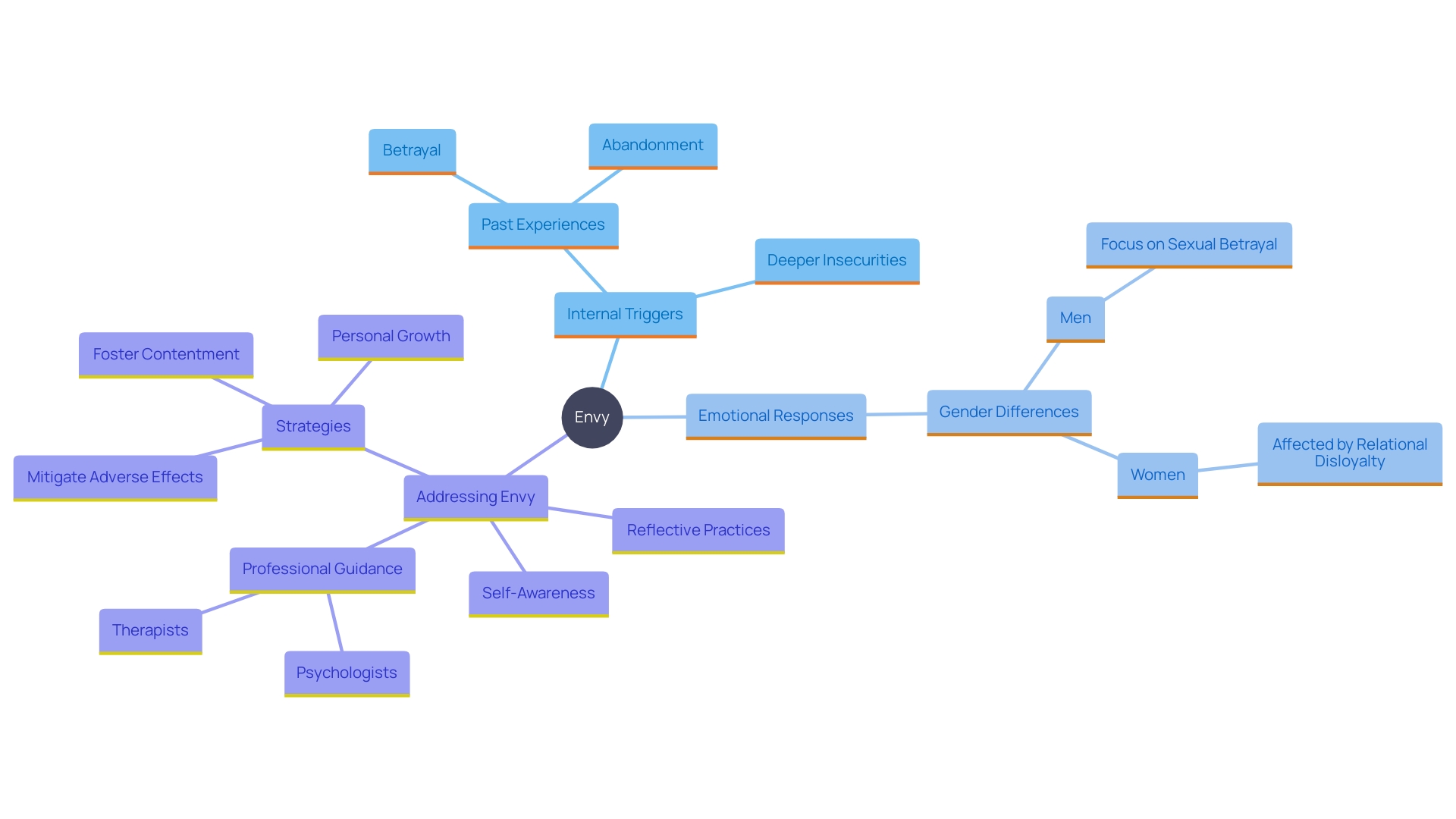
Effective Techniques to Overcome Jealousy
Surmounting feelings of envy requires a multifaceted approach that involves self-reflection and practical strategies. A crucial step is to cultivate self-awareness, which allows individuals to recognize the various emotions tied to envy, such as anxiety, fear, protectiveness, possessiveness, and competitiveness. By identifying these feelings, one can better understand their emotional impact and address them effectively. As Professor Bendixen and Professor Leif Edward Ottesen Kennair's research indicates, understanding one's own emotions and those of others can significantly influence how jealousy is perceived and managed.
Another effective strategy is to practice self-compassion. According to a study by the Otto Friedrich University Bamberg and the Martin Luther University Halle-Wittenberg, self-compassion in romantic partnerships enhances happiness and satisfaction for both partners. This involves being kind and understanding towards oneself, especially when dealing with personal shortcomings. Training in self-compassion can be a valuable tool in couples' therapy, leading to improved relationship health. The study surveyed 209 heterosexual couples and found that men, in particular, benefit when their partners are self-compassionate.
Open communication with partners or friends about one's feelings can also foster trust and reduce misunderstandings. Being transparent about emotions helps in building a supportive environment where both parties can work together to address jealousy. Additionally, practicing emotional regulation techniques, such as deep breathing or grounding exercises, can help manage intense feelings when they surface. The Stop-Breathe-Reflect-Choose approach is one practical method that can aid in self-regulation, allowing individuals to respond thoughtfully rather than react impulsively.
Ultimately, addressing feelings of envy involves understanding and managing one's emotions, fostering open communication, and practicing self-compassion. These strategies not only assist in overcoming feelings of envy but also contribute to healthier and more fulfilling relationships.
Cultivating Self-Love and Self-Compassion
Cultivating self-love and self-compassion plays a crucial role in managing jealousy. When people cultivate a strong sense of self-worth, they feel less threatened by others. Positive affirmations, journaling about personal strengths, and celebrating small victories can significantly enhance self-esteem. According to Dr. Nancy Tandler from the Institute of Psychology at MLU, self-compassion influences not just individuals but also their romantic relationships. Through comprehensive surveys, researchers have found that self-compassion can be developed and is instrumental in resolving conflicts and managing feelings of resentment. Self-love offers a powerful tool for those healing from trauma, creating a sense of inner safety and acceptance. As clinical psychologist Diana Hill notes, “Self-criticism lowers your self-confidence and increases anxiety and depression, undermining your ability to take steps toward change. In contrast, self-compassion encourages you to make healthier choices and look after yourself. Ali Smith, Atman Smith, and Andres Gonzalez, who work with youth in West Baltimore, also highlight that self-love practices can open our hearts, making it easier to handle challenges.
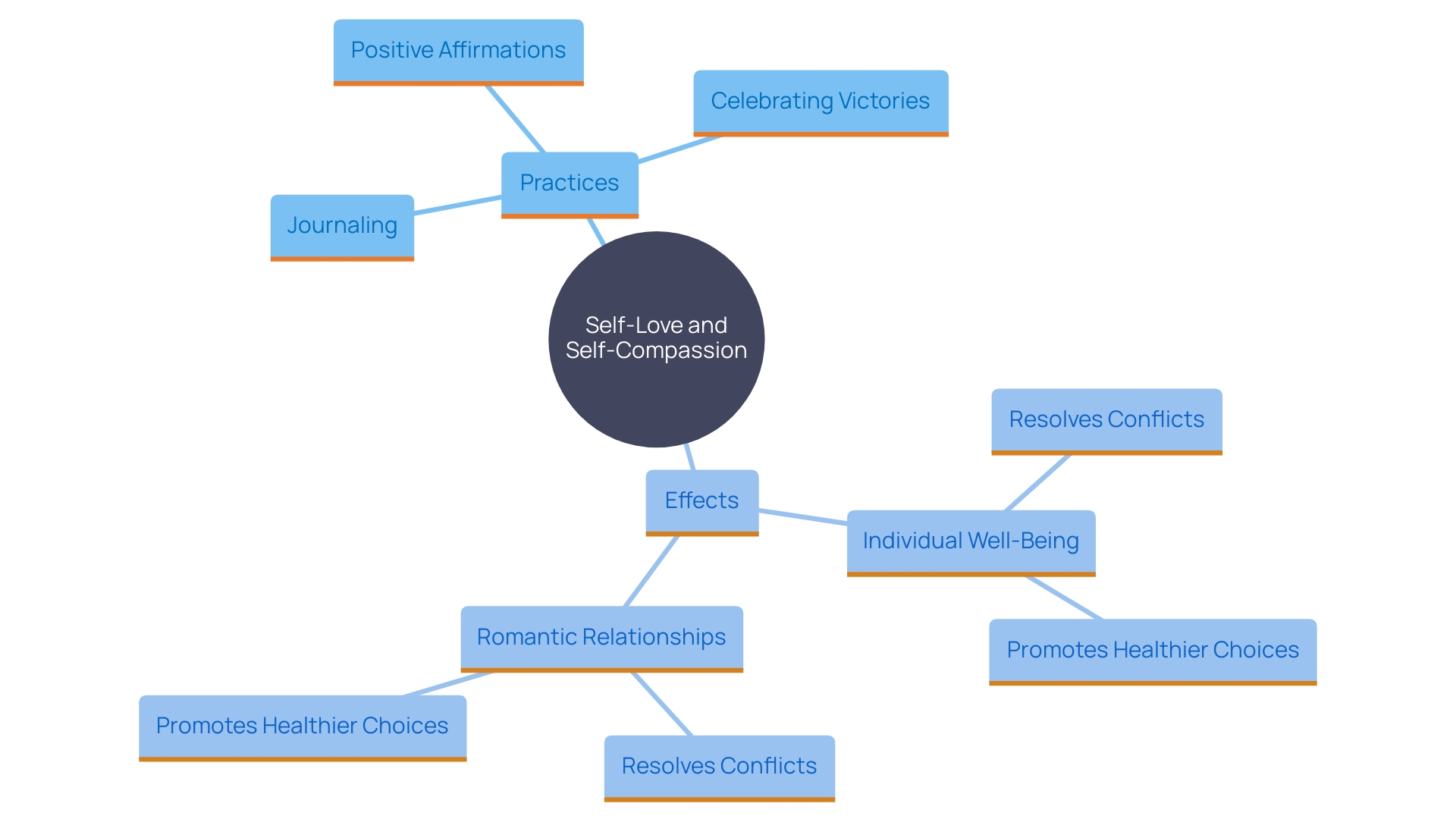
Practicing Mindfulness and Meditation
Mindfulness and meditation are transformative tools for managing jealousy, rooted in practices that encourage staying present and observing thoughts and emotions without judgment. These techniques encourage a non-reactive mindset, decreasing the intensity of jealous feelings and offering clarity on reactions. A meta-analysis has indicated that mindfulness interventions improve cortisol levels, suggesting stress reduction and resilience. Furthermore, studies highlight mindfulness' role in enhancing mental health and well-being. For instance, research by Gabrieli and his team found that children with higher mindfulness levels exhibited greater resilience during the COVID-19 pandemic, experiencing lower stress, anxiety, and depression. Consistent mindfulness practice develops mental strength, facilitating the handling of envy as it appears. As mindfulness expert Kristin Neff, PhD, states, 'Mindfulness provides a strong empirical and theoretical foundation to understand its essential role in emotional resilience and healing.' This approach aligns with modern psychology's growing consensus that engaging with our emotions openly can teach us powerful lessons about ourselves.
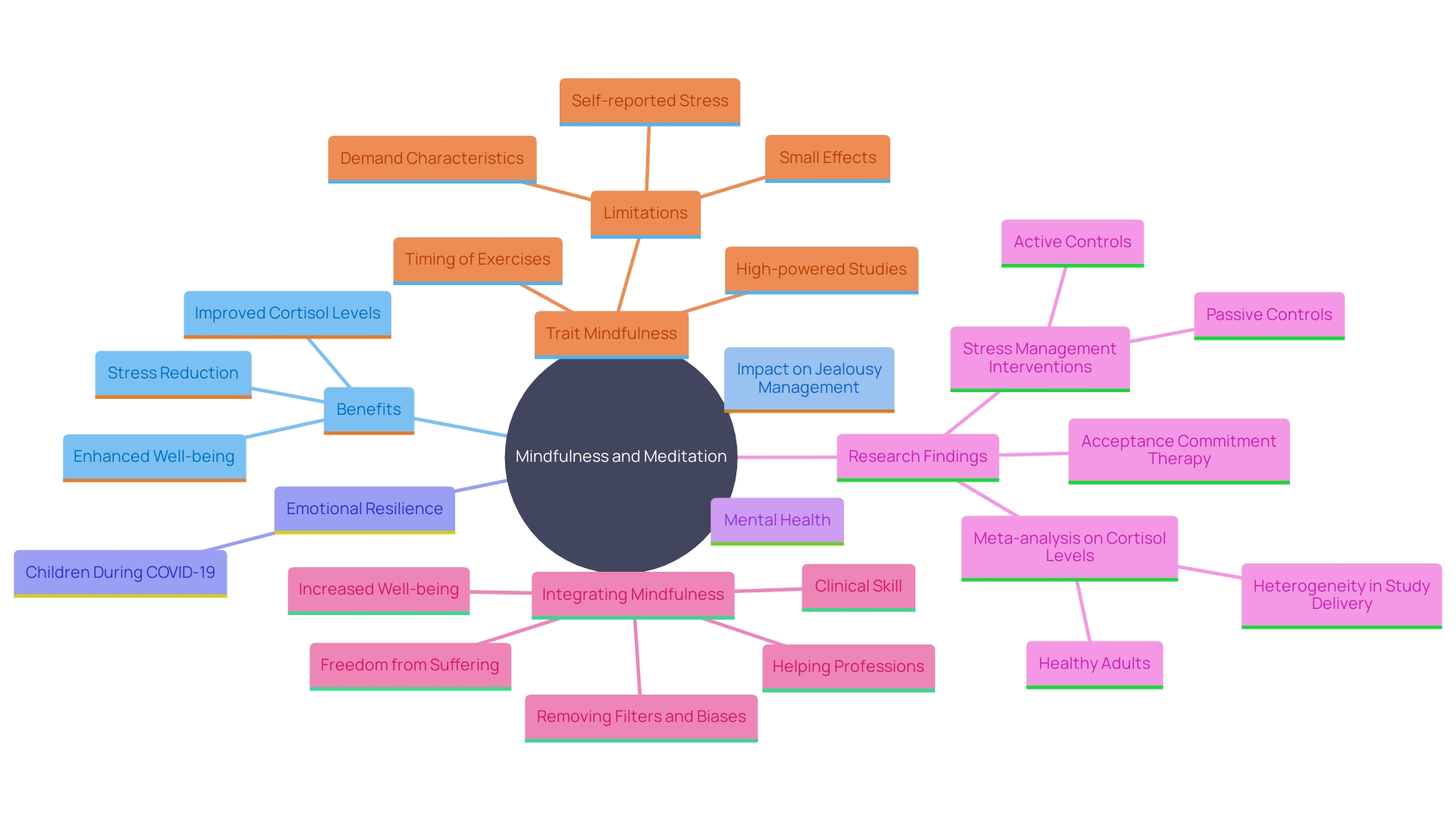
Focusing on Gratitude and Positive Energy
Redirecting attention from envy to appreciation can change negative feelings into positive ones. Maintaining a gratitude journal, where people not things they value in their lives and connections, can assist in reshaping their mindset. This practice encourages a sense of abundance rather than scarcity, reducing the fear of losing what one has. By fostering positive energy and recognizing the good in their lives, individuals can diminish feelings of jealousy. A systematic review and meta-analysis of gratitude interventions found that such practices not only enhance feelings of gratitude but also improve mental health and reduce symptoms of anxiety and depression.
Gratitude has been demonstrated to positively influence psychological well-being and the quality of social and romantic connections. For instance, research by Sara Algoe at the University of North Carolina at Chapel Hill highlights that high-quality relationships, both romantic and platonic, are linked to better mental and physical health and can even contribute to a longer life. In a study involving more than 49,000 female nurses, those who frequently noticed and felt grateful for positive experiences had a 9% lower risk of death from any cause compared to those who were less grateful.
Furthermore, showing appreciation can have significant effects on mood management and social interactions. As Dr. Moye observes, concentrating on the positive aspects of our lives can reduce feelings of sadness and concern, resulting in improved mental well-being. This sentiment is echoed by Christina Canon in a New York Times article, which underscores that gratitude reflects the goodness in life and acknowledges the role of others or a higher power in our well-being.
In summary, incorporating thankfulness into everyday routines through activities such as journaling can greatly diminish envy and improve overall mental well-being, promoting stronger and more satisfying connections.
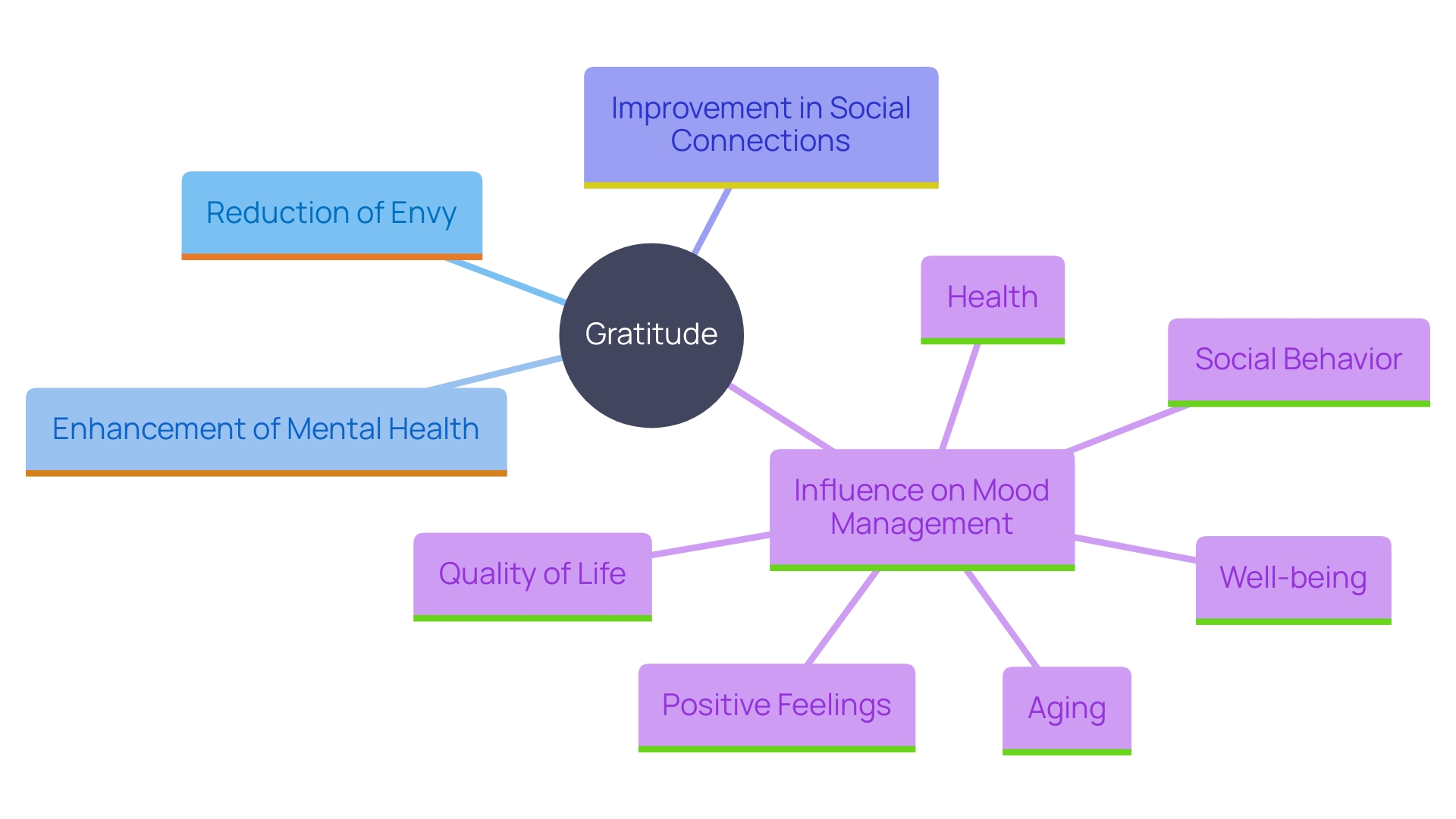
Building Supportive Relationships and Seeking Professional Help
Creating a supportive network is essential in overcoming feelings of envy. Engaging in open conversations with trusted friends or mentors can provide valuable perspectives and emotional support. For instance, addressing difficult feelings with love and understanding, instead of blame, can facilitate easier and more productive discussions. Additionally, seeking professional help from a therapist can be immensely beneficial in navigating complex emotions. Therapy provides a secure environment to investigate the origins of envy and create efficient coping methods customized to personal requirements. According to research, self-compassion in romantic relationships significantly enhances happiness and satisfaction for both partners. In fact, being more forgiving of your own shortcomings can lead to happier couples, as shown in a study involving 209 heterosexual couples. Evidence-based modalities have proven to be extremely effective, with 70% of couples reporting positive effects from counseling. Concentrating on love and kindness instead of envy can turn difficult feelings into chances for development and stronger bonds.
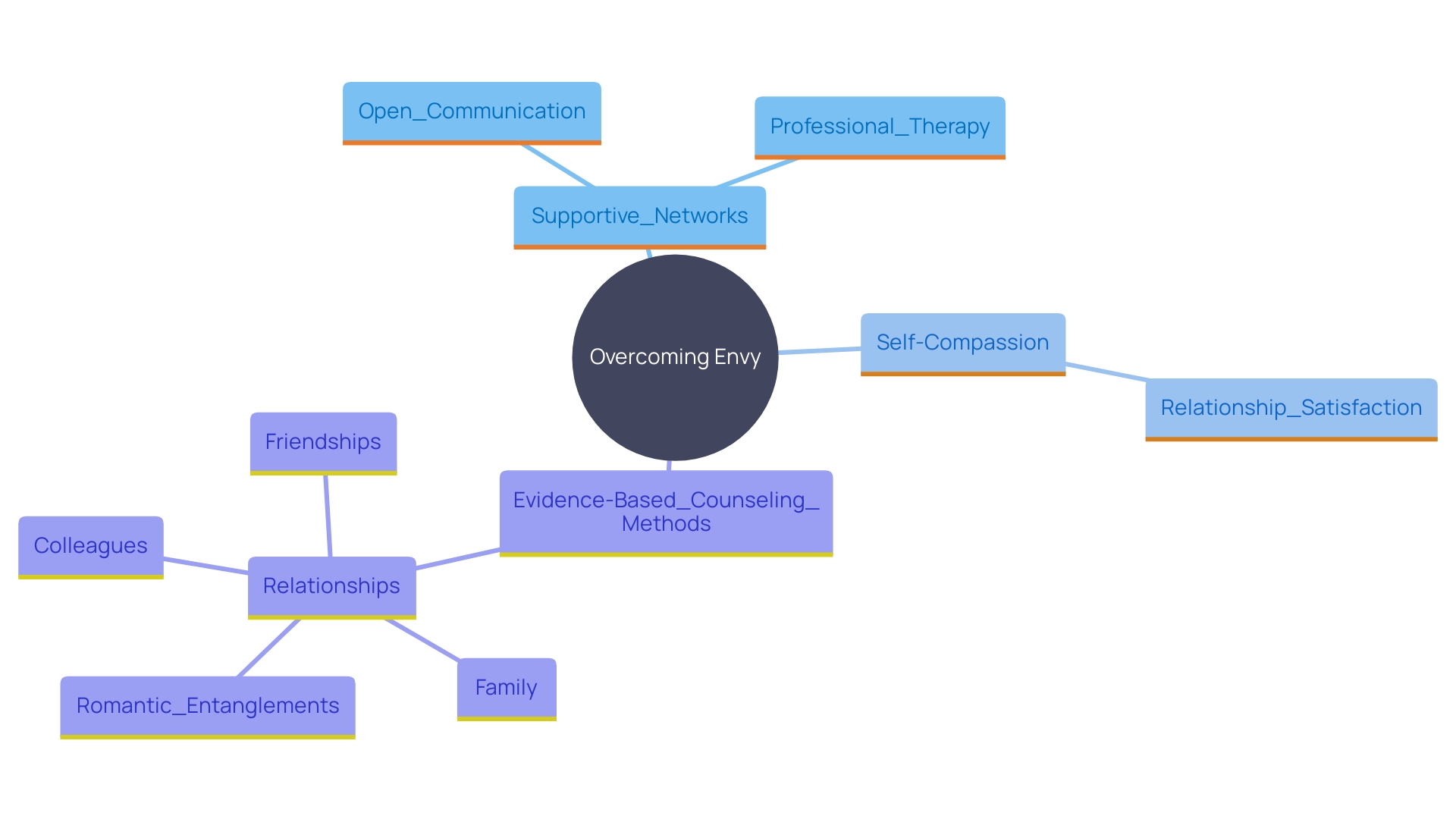
Reframing Jealousy: Turning It into Motivation
Reframing envy can be an empowering approach to managing this challenging emotion. Rather than perceiving envy only as a harmful emotion, people can regard it as a spark for personal and relational development. For instance, if envy arises from a partner's achievements, it can serve as inspiration to pursue one's own goals and ambitions. By directing jealous emotions into positive actions, individuals can promote personal growth and enhance their connections.
Furthermore, embracing feelings intelligence and regulation techniques, like cognitive reappraisal, can further transform how we perceive and respond to jealousy. Managing feelings is essential for enhancing our quality of life and connections, allowing us to handle challenges with increased resilience and kindness. As Dr. Marc Brackett from the Yale Center for Emotional Intelligence suggests, nurturing environments that support personal growth are essential for mental well-being and individual development.
In addition to self-improvement, open communication and honesty in relationships are vital. Meeting unfulfilled psychological needs, such as feeling cherished or appreciated, can stop envy from appearing as adverse feelings. Consistent, truthful discussions regarding these needs can improve emotional closeness and lessen misinterpretations that may result in resentment. According to a study by the Martin Luther University Halle-Wittenberg (MLU), self-compassion within relationships significantly enhances happiness and satisfaction for both partners, underscoring the importance of mutual understanding and support.
Grasping the essence of envy and its underlying causes can also be informed by research. For instance, research has demonstrated that males and females experience envy in distinct ways, with males being more impacted by sexual betrayal and females by relational betrayal. Acknowledging these distinctions can assist people and partners in managing envy more efficiently, promoting a more compassionate and supportive dynamic.
Ultimately, redefining feelings of envy involves a combination of self-reflection, emotional intelligence, and open communication. By viewing jealousy as an opportunity for growth and connection, individuals can transform this challenging emotion into a source of strength and resilience in their relationships.
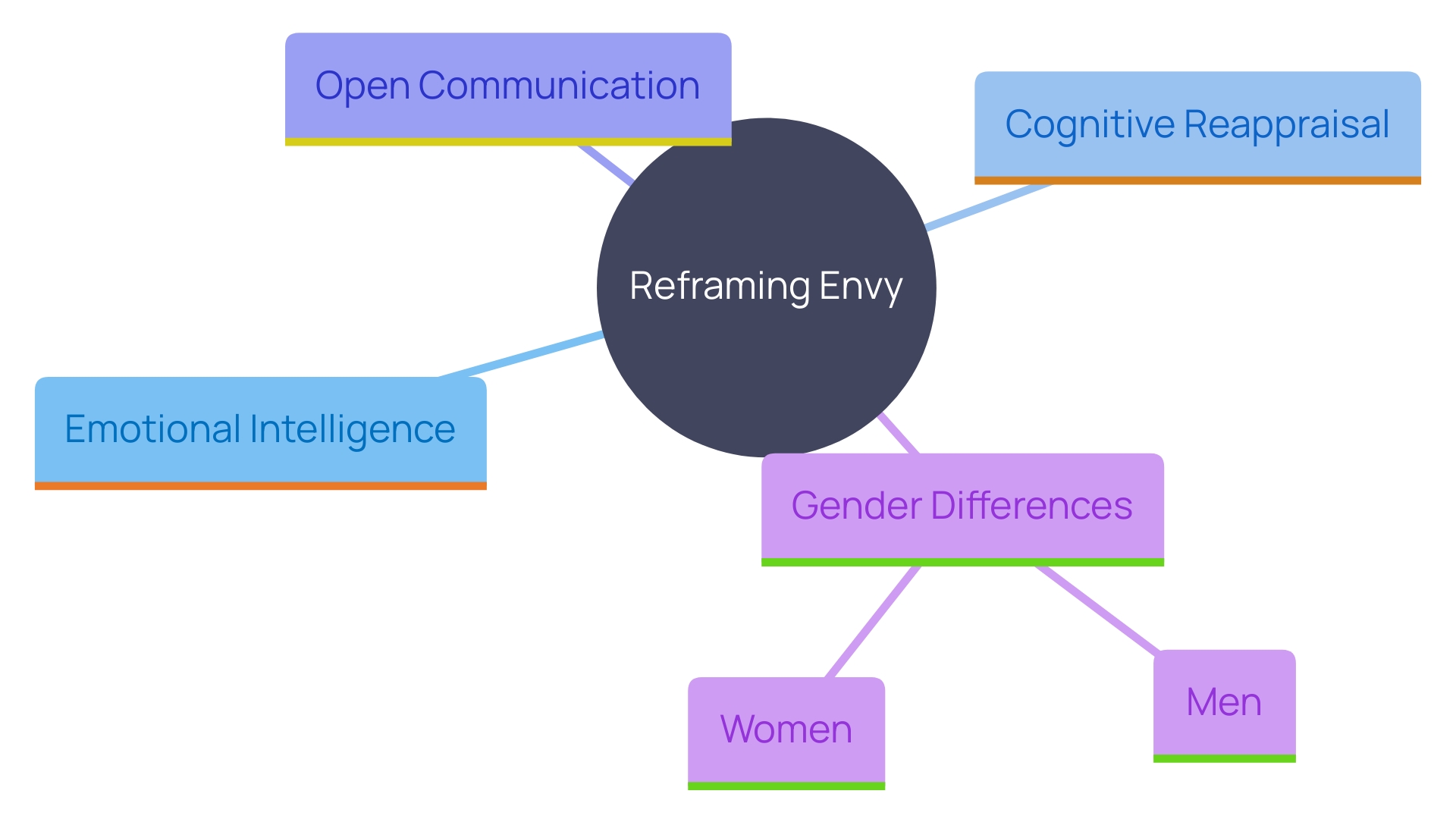
Conclusion
Jealousy, while often viewed as a negative emotion, can serve as a powerful catalyst for personal growth and improved relationships when approached with understanding and compassion. Recognizing that jealousy stems from deep-rooted feelings of inadequacy and fear of loss allows individuals to address these emotions constructively. The distinction between how jealousy manifests in different genders emphasizes the need for tailored approaches to manage and overcome these feelings.
Addressing jealousy requires a multifaceted approach that includes self-reflection, open communication, and the cultivation of self-love and self-compassion. Techniques such as mindfulness, gratitude practices, and establishing supportive relationships can significantly mitigate feelings of jealousy. By shifting focus from jealousy to appreciation and positive connections, individuals can foster a healthier emotional landscape and enhance their overall well-being.
Ultimately, reframing jealousy as an opportunity for growth can transform it into a source of strength rather than a barrier. By embracing emotional intelligence and engaging in honest conversations, individuals can navigate their feelings more effectively, leading to deeper connections and a more fulfilling life. Through patience and consistent effort, it is possible to turn jealousy into a motivator for positive change, enriching both personal and relational experiences.




